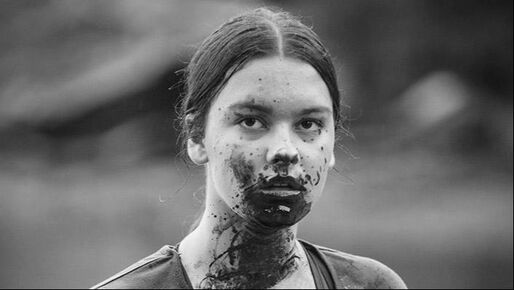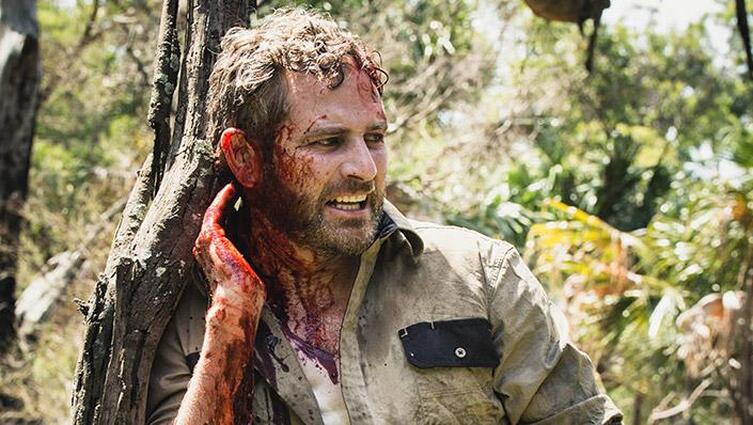 Anthology films are a tricky business... ...They can be great training grounds for hungry, young filmmakers looking to make their mark. They’re also a great vehicle for the horror genre; bite-sized shorts can be great fun and a sharp showcase for talent. Films like Southbound (2015), The ABCs of Death (2012), and the VHS series saw great success amongst the horror community and the trend doesn’t seem to be slowing. The only downside to anthologies is the reality that each short varies in quality. Every anthology has at least a few stinkers in the lineup. Having just made its UK Premiere at the FrightFest Film Festival, Dark Place is a collection of five shorts, all directed by indigenous Australian filmmakers. Screen Australia certainly has an interesting anthology on their hands, but its aboriginally rooted stories may not have the profound impact it’s intending. “Scout”, directed by Kodie Bedford, throws us into the repulsive and disturbing world of sex trafficking. Probably my second favorite of the five, “Scout” follows the terribly unfortunate lives of three women who must learn to live in near uninhabitable conditions. Without notice, one or all three women can be plucked from their cell at any time to perform whatever sexual acts the client wants. One day, a tragic event leaves only two of the women alive. Drunk on rage after months of abuse, Scout (Katherine Beckett), manages to fight back, hell bent on escaping. While I found the ending a little tonally jarring and somewhat campy, everything leading up to that felt visually and narratively engrossing. Even though the time spent with the women is brief, we care deeply for them, not just because of their situation, but because of their convincing performances. The amount of stress and trauma these women undergo is appalling, and their freedom becomes a rooting necessity. The sense of atmosphere in “Scout” is very rich. Largely taking place in shipping containers (the women’s quarters), you can almost feel the cold metal encompassing them and every scratch, bruise, and smudge of dirt, are all details that help sell the story well. There is a bit of social commentary alluding to the wrongs of institutional racism, but it felt natural and never forced. I’m glad they chose “Scout” to kick off the anthology, as it’s definitely the most gut wrenching and emotionally effective offering. Up next, we have “Foe”, directed by Liam Phillips. With a heavy focus on mental health and paranoia, this short tells the story of Elena (Leonie Whyman), a woman who has been struggling with fatigue and lack of sleep. Worried that she may have something wrong with her, she seeks help from a psychiatrist who suggests she document her sleeping patterns with her video camera. To Elena’s surprise, she discovers that she’s been sleepwalking, and not only that, but she finds dirt on the floor, suggesting she’s even been going outside. Reviewing footage of the following nights, the sleepwalking appears to get worse; she even gets blood on one of her gowns. Elena now enters full blown panic mode and the short crescendos to a bloody climax. Ultimately, I was disappointed by this one. While it’s shot exceptionally well, I found the overall message to be muddled. Mental health is a subject that demands a certain level of respect and careful handling. At first, I thought the short may have been trying to criticize her physician, but he actually offers her sound advice, rather than only prescribing her medication. To me, he seemed genuinely invested in her overall health. I’m the first person to defend a film’s right to avoid political or social commentary for the sake of simply telling a good story, but “Foe” gets lost in what it’s trying to say. What we’re left with is a mediocre short that comes across as hollow and lacking anything tangible to grab onto. Despite being one of the more unmemorable shorts, Whyman does an excellent job conveying her emotional state, which leads me to believe this could have been so much more with better handling. Rob Braslin’s “Vale Light” follows Shae (Tasia Zalar) and her young daughter Isabelle (Jolie Everett), who meet the suspiciously friendly neighbor, Diane (Sara Pensalfini). Diane quickly befriends the two and it becomes clear that she has her sights set on Isabelle for reasons unknown. Concerned that her daughter is spending time with Diane in her home, Shae begins to question Diane’s true intentions. We learn that Isabelle harnesses a great power and Diane will stop at nothing to acquire it. Again, we have a great looking short, but one that is devoid of anything memorable. The child with powers trope has been done to death and, unfortunately, “Vale Light” fails to do anything imaginative with it. The overall look of the short is consistent and it’s shot competently, but aside from a few interesting foreshadowing clues, there’s nothing here that’s likely to frighten, educate, or even entertain the viewer. A horror anthology isn’t complete without a vampiric tale thrown in somewhere. That’s where Perun Bonser’s, “The Shore” fits in. Shot in black and white and without much dialogue, “The Shore” is, by my account, the best short of the lot. Set in the Australian wilderness, we’re introduced to Selena (Luka May Glynn-Cole) and her father, Barry (Bernard Curry). After being shot by unknown assailants, Barry makes it to his home, where Selena does her best to doctor him up. Flash forward to Barry and Selena at a diner, and it appears that the previous events might have been a dream. As Selena tries to eat, she immediately vomits and is unable to hold anything down. Barry inspects her and notices that her teeth are falling out. Saying anything more will spoil everything, but I think we can all surmise that Selena grows fangs! From there things get pretty dark, but it ends with a satisfying narrative conclusion. Upon first viewing I found this one pretty incoherent and confusing, but like most films of a time jumping nature, things begin making sense upon closer inspection. Out of all the shorts, I feel like “The Shore” marries visual prowess with narrative satisfaction the best, as both receive equally close attention. I’m also just a sucker for vampire stories. The final short, “Killer Native”, directed by Bjorn Stewart, takes any pretentiousness you might have interpreted from the previous shorts and fires it out of a cannon. This is horror slapstick without any disclaimers or apologies. Unlike the camp that felt foreign to the tone of some of the other shorts, it’s completely intentional and appropriate here. In this story, two romanced colonial settlers arrive at a plot of land that the British gentleman (Charlie Garber) proudly claims as his. Just as the two begin daydreaming about the grand potential of their land, a native of the land storms up to them, babbling that a dangerous creature stalks the lands. What proceeds is a fury of crude toilet humor, racially charged jokes, and gratuitous violence that plays like a gore filled episode of Tom and Jerry. Some of it is funny, while some of it is not, but the entire attitude of the short is playfully rebellious and juvenile. I can see “Killer Native” being quite offensive to some, but as someone who appreciates a sturdy middle finger to everything now and then, I got quite a kick out of it. Horror anthology films usually consist of highs and lows from short to short. There are a few exceptions that manage to maintain a steady level of quality throughout, but it’s a hard bar to reach, and I don’t hold the failure to reach that bar against this film or any other anthology. The strange thing about Dark Place is instead of highs and lows, most of the films hover in the middle, with a small spike here and there in either direction. It’s a static flow of mediocrity for the most part, which makes for a pretty unmemorable film. Despite being quite fond of some of the shorts, the feature as a whole doesn’t really have anything to say. Of course, that’s subjective and someone else may have extracted things from this that I never noticed, but I just didn’t feel the cohesion that’s necessary for an anthology to work. This may be fine for a rainy day of movie watching, but there are several superior options if you’re looking for a more unified narrative. By Jeffrey W. Hollingsworth
0 Comments
Leave a Reply. |
Archives
March 2023
|


 RSS Feed
RSS Feed